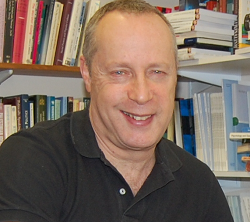Understanding the appeal of ISIS

An article in the latest issue of the magazine Scientific American Mind by two leading social psychologists, Stephen Reicher of the University of St Andrews and Alex Haslam of the University of Queensland, provides a new way of understanding the psychology of terrorism.
Previous efforts to understand what makes some people capable of the indiscriminate murder of innocents have focused on the mind of the individual: Reicher and Haslam argue instead that most terrorists are not psychopaths and that we must understand terrorism as a group process.
The authors’ analysis shows how the strategy of organisations like ISIS is based on a world polarized into faithful Muslims and non-Muslims. ISIS presents itself as leading the Muslim cause and working to create a powerful state that restores pride to Muslims by striking back at those who have humiliated them.

Professor Reicher (pictured right) said: “Acts of terror are designed to provoke indiscriminate responses that give credibility to this vision.
“If, in their everyday experience, Muslims find themselves regarded with suspicion, treated as outsiders, and viewed with enmity even in their own country then this can weaken their sense of citizenship.
“Moreover, if one has the experience of being treated as an enemy in one’s country, those who insist that the country is one’s enemy become more plausible. It is in this way that the willingness to cooperate with authorities diminishes and the appeal of radical groups increases.”
Professor Haslam added: “People who commit the most appalling acts generally believe that they are acting in terms of a noble cause.
“We need to understand how ordinary young people come to identify with such toxic causes and to believe those who tell them that our countries are their foes.
“We must be very wary of responding to terrorist outrages in a way that plays into the extremists’ view of a world polarized between Muslims and non-Muslims. Anything that serves to demonise and marginalize Muslims in our societies, to erect barriers between ‘us’ and ‘them’, can only assist the recruiting agents of terror.”
Notes to news editors
Stephen Reicher is Professor of Psychology at the University of St Andrews, a Fellow of the British Academy and a Fellow of the Royal Society of Edinburgh.
Email: [email protected] Tel: (+44) 1334 463057
Alex Haslam is Professor of Psychology and Australian Laureate Fellow at the University of Queensland.
Email: [email protected] Tel: (+61) 468 547291
Professors Reicher and Haslam recently collaborated on the award-winning book The New Psychology of Leadership. Their ongoing collaboration has changed understanding of the basic psychology of conformity, obedience and tyranny.
The article ‘Fueling Terror: How Extremists Are Made‘ is currently available online and will be published in the May/June 2016 issue of Scientific American Mind, due on newsstands on 19 April 2016.
Category Research